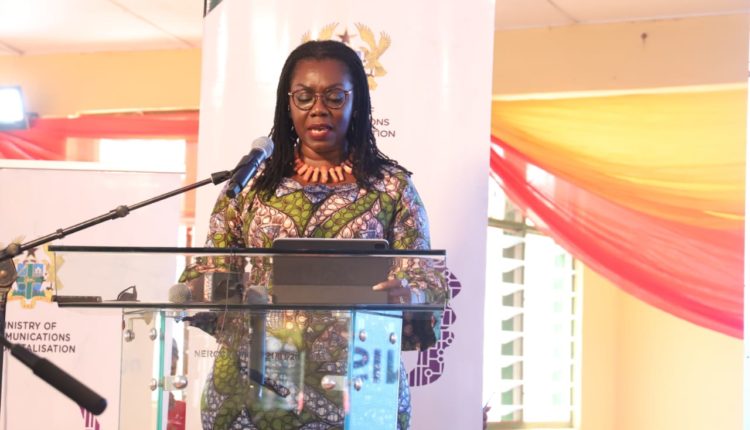Ghana’s Communications and Digitalisation Minister, Mrs. Ursula Owusu-Ekuful has said the country needs to take deliberate steps to change the status quo which makes women and girls lag behind and unable to participate in the digital space; where there are gross inequalities in work and wages.
According to her, women overwork yet are underpaid, and many women do not find space to participate in decision making at all levels.
“The contribution of women to Ghana’s development is indispensable and we cannot achieve our goal of a “Ghana beyond Aid” without adequately equipping women and girls for the post covid digital world of work. From education, health, trade, Agric to meetings and social interactions, sending and receiving money and paying for goods and service, everything is now dependent on digital infrastructure and services.
“How do we participate in this world if we don’t know how to?We cannot continue to raise our girls to think that everything technological, digital, electronic among others is reserved for men only. When they are taught, they can learn, compete and excel in anything they put their mind to” Mrs. Owusu-Ekuful made it known at the climax of the Girls in ICT event at Gambaga in the North East Region where about 1000 young girls were introduced to basic ICT skills and coding.
The Girls were selected from six districts: East Mamprusi Municipal (Gambaga); West Mamprusi Municipal (Walewale); Bunkpurugu Nakpanduri (Bunkpurugu); Chereponi District (Chereponi); Yunyoo Nasuan District (Yunyoo) and Mamprugu Moagdiri District (Yagaba).
On his part, the chairperson for the event, Chief Mba Taraana admonished the young girls to utilize the knowledge acquired to enrich the society they live in.
The North East Regional Minister, Yidana Zakaria was optimistic the training will help curb the rural urban migration amongst the young girls and motivate them to invest in their education.
Ms. Juliet Apetigah, a student of the Walewale Girls Model Junior High School who had no prior experience in ICT, expressed gratitude to the Ministry of Communications and Digitalisation and partners for the initiative.
She said the training had broadened their knowledge and skills in ICT.
The best 100 girls were awarded with laptops and certificates provided by GIFEC with the best 10 girls given modems with a one-year data subscription in addition. However, the various schools of the best 10 girls will be equipped with an ICT laboratory.
Lack of Girls in ICT narrowing development
This comes after the Member of Parliament for the Ablekuma West constituency, Mrs Ursula Owusu-Ekuful months ago indicated, the gross underrepresentation of girls in Science Technology Engineering and Mathematics (STEM) disciplines is not just an educational challenge but a developmental concern which needs to be addressed if we are to harness the benefits technology offers citizens.
The lawmaker made particular reference to a 2017, UNESCO report in 2017 titled “Cracking the code: Girls’ and women’s education in STEM”, which estimated that only 35% of STEM students in higher education globally are women, and differences are observed within STEM disciplines and specific countries.
“The picture is even more worrying when it comes to information and communication technologies. It is estimated that only 3% of female students in higher education opt for information and communication technologies (ICT) studies which also means women make up just a fraction of the workforce in these STEM related fields. It is also estimated that women hold just 24% of all jobs in the digital economy as at 2018 and the statistics have not changed” she said.
Mrs. Owusu-Ekuful was speaking at the 75th anniversary of the St Monica’s Old Students Association (SMOSA) at the Fiesta Royale Hotel in Accra, as the guest of honour. The program was under the theme: ‘Educating Girls in the World of Technology’.
She stressed the need to bridge the digital gender disparity especially in the era where technology drives everything and STEM careers are the jobs of the future, driving innovation, social wellbeing, inclusive growth and sustainable development.
“Nation building requires the contribution of all, and technology is the key driver of growth and economic and social transformation in the recent history of the world. The COVID pandemic has taught us that. Even though we see prospects, the digital revolution is revealing an underrepresentation of women in terms of contributing to this transformation” she noted.
The Ministry Role
According to Mrs. Owusu-Ekuful, the world is technology driven and “we are transitioning to a virtual way of living. Our ability to adapt to innovative ways of doing things is essentially important to our survival. Technology has proven to be the key to improving what we do and derive maximum benefits from it. We have been able to manage this pandemic because of the role technology played and is still playing”.
The Ministry of Communications and Digitalisation, she said is poised to facilitate the adoption and use of technology in all sectors of the economy, including education, as part of the digital transformation agenda to engender efficiency, improve productivity and facilitate growth.


Comments are closed.